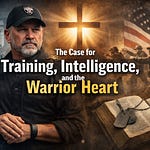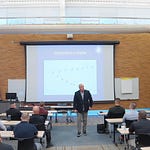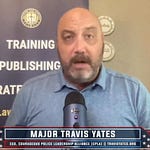I’m a huge western fan and today, the first chapter of Kevin Costner’s movie, “Horizon: An American Saga,” starts at theaters. In a recent interview, Costner made a statement that resonated with me.
“I feel a lot of cowardice.”
Unless you are a coward, you probably do as well. As I referenced cowardice in my book, “The Courageous Police Leader,” Costner was also talking about leadership across the country and those that remain silent in the face of it.
Moral vs. Physical
Cowardice in leadership has nothing to do with physical courage. I’ve always found it amazing how someone can run through an alley chasing a suspect with a gun without hesitation but then sit at a desk shuttering in fear to make the right decision.
The Why
After three decades in law enforcement, I’ve seen cowardice leadership manifest itself for one main reason…fear. Fear is the enemy of courage but fear is also what defines courage.
It’s not courageous to go with the popular narrative.
It’s not courageous to agree with the masses.
Going with the crowd is not only easy but safe. Your status, job, or reputation will never be at risk as long as the majority of those around you agree.
But what happens when the narrative is a lie or the prevailing sentiment hurts an employee when they did nothing wrong?
Are you prepared to face that fear?
If you are like me, you’ve failed many times when you faced the crossroad of courage or cowardice but over a decade ago, I had enough and I had to train and understand what courageous leadership was.
The Final Act of Cowardice
Years ago, I commanded the public information office at my agency and the media relations officer was a great guy. While I liked him, we were well down the path of everything changing as it related to the media. We had gone from fax to email to video rapidly and I thought a change in personnel would help ease that transition. When I told my boss that I intended to transfer the officer out, he told me not tell him the reason why. One month out of the year my agency could transfer anyone for no reason and it was such a sick and twisted practice, we had a name for it.
Tis The Season For No Reason
This was the practice at the agency and it was done for one reason. Rather than managers (not leaders) documenting, mentoring, or helping employees, they could simply ship them off to another assignment for another manager to deal with. But there was a bonus reason for the practice…The union couldn’t grieve it and the employee had no recourse.
That is why I was told not to give him a reason. If I gave him a reason, I was told, he may fight it with the union.
I was a young commander and just returned from the FBI National Academy. At the time, I was given a lot of responsibility and making decisions that impacted not only the agency but the entire city. My trajectory was high and going higher and while I didn’t feel comfortable taking the cowardly approach towards this officer, I did what I was told but I’ll be honest.
I did it because I feared hurting my own status with those above me.
Cowardice To Misery
As expected, the decision did not go well with the officer. Understandably, he was upset and confused. He wanted to know why and I didn’t tell him. He made a lot of assumptions which was expected and what was once a friendship turned south pretty quick.
The feeling I had in the months that followed can’t be described but I was sick at my decision. No one should be treated like that and I was a coward for doing it.
Embracing Courage
Several months had passed and after another sleepless night, I decided to embrace courage. I met with the officer and told him everything. I explained why I acted the way I did, I apologized and I vowed to him and myself, that I would never be a coward again. In an act of grace, he thanked me and forgave me but I was never going to be a coward again.
As I’ve previously discussed, leadership is not a natural act that can be done courageously without actual training and this is why we conduct seminars across the country.
While I can’t cover it all today, I can tell you some of the characteristics that reside in courageous leaders and they are the hallmark of placing others over themselves, regardless of the consequences.
Courageous Leaders are truth tellers.
Courageous Leaders place their character over their reputation.
Courageous Leaders understand that leadership isn’t about status or rank but rather it is about the impact you can make on others.
Ultimately, Courageous Leaders do what is right regardless of what anyone thinks, says, or does.
There is never a compromise, and they are willing to risk “world” success for the true success of what leadership represents.
What About You?
Once in a while my mind goes back to the day I decided that courage would always prevail.
My rank came to a screeching halt.
I was disliked by many of my peers.
I was told to toe the line more times than I can remember.
I was called controversial and other names that can’t be mentioned here.
I spent years in assignments that weren’t exactly glamorous.
What if I would have turned the same direction as the vasty majority of other high ranking leaders?
What could I have become?
And then I stop thinking about it because regardless of what could have been…I would have been a coward and we have enough of those.
Fortune Favors the Brave…Go Be Brave!
Dr. Travis Yates retired as a commander with a large municipal police department after 30 years of service. He is the author of “The Courageous Police Leader: A Survival Guide for Combating Cowards, Chaos & Lies.” His risk management and leadership seminars have been taught to thousands of professionals across the world. He is a graduate of the FBI National Academy with a Doctorate Degree in Strategic Leadership and the CEO of the Courageous Police Leadership Alliance.










